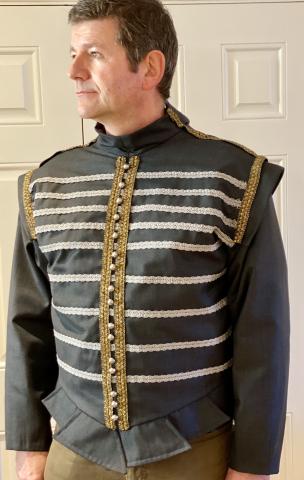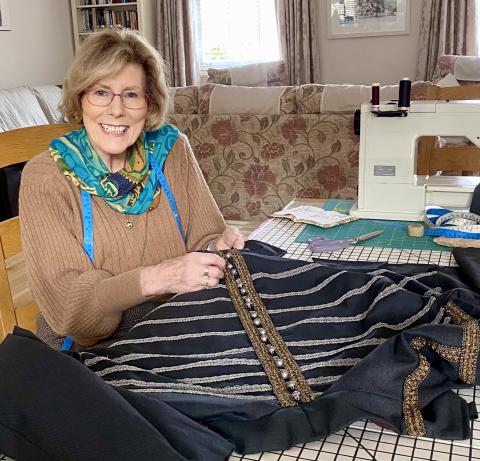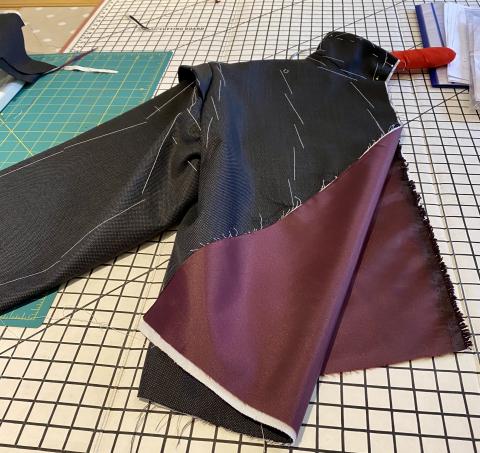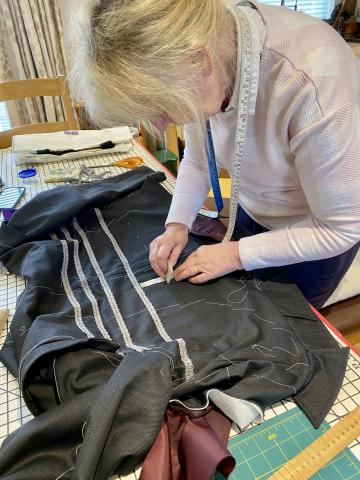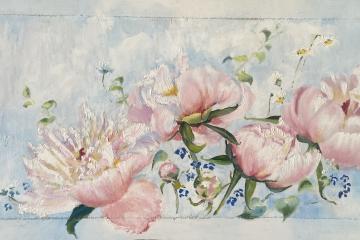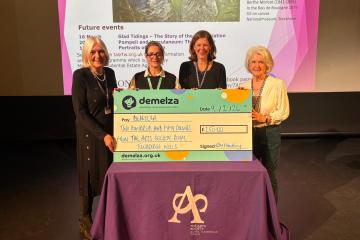Dressing Up Shakespeare: A volunteer story into Tudor Costume Creation
Dressing Up Shakespeare: A volunteer story into Tudor Costume Creation
22 Jan 2024
Tudor Costume Project
This was an exciting interactive Tudor costume project to work on, made even more enjoyable for me, with the help of my two volunteers, Lucy, and Fiona. Emily White, Curator at The Shakespeare Birthplace Trust, contacted me through Stradfas and told me of her vision for the project. Her idea was for the tourist to feel part of the Tudor scene and be able to dress up if they wished in these costumes to look like one of the paintings displayed around the walls of the Shakespeare Birthplace. The project becomes interactive allowing them to take a selfie, stepping back in time to the 17 th century. A dressing table and mirror are in place in the exhibition hall, as the Tudor costumes are made open at the centre back, visitors can slip them on, over their own garments.
This is quite unlike the first Tudor costume I made for Susanna, Shakespeare’s daughter, which was purely for display and is still displayed at the Birthplace.
Reconstructing any historical costume takes time and patience, finding the right fabrics to work on, plus using the correct techniques to enable the finished costumes to hang correctly on the body. To accomplish this the Shakespeare Doublet was interlined with a quality weight calico.
The top fabric was a woollen mixture, these two fabrics were then basted together, once this was done, they were then worked on as one fabric, giving the fabric, the body it required for the Doublet. As the doublet was to be left open at the centre back, I decided to leave the front open too, enabling Lucy and I to work on each half of the doublet separately, making a left and a right side, this worked well. As there was no fitting to be done, we made the sleeves first and fully lined them. Once the sleeves with the wings and the collar were machined in place and fully lined, I then machined the centre front seam. I left the lining free until the costume was almost finished, at this stage, I machined in place the lower front tabs, before Lucy marked the position of the front trimmings and gold decoration.
Once the trimmings were machined in place, the lining was then machined together down the centre front. I anchored this neatly in place by topstitching in the ditch along the lower edge above the tabs, this can only be seen from the lining inside the doublet.
To complete the doublet, the heavy metal buttons were then sewn in place and a black 2.5cm wide twill tape was stitched each side of the centre back opening, enabling visitors to alter the back width to fit them.
I thoroughly enjoyed working on this Shakespeare Doublet, as a fashion designer also trained in bespoke tailoring and haute couture, I was very keen to share and pass on my techniques to Lucy and Fiona, we worked well together, and I know they can be called on at any time in the future.
The ladies Tudor costume was also being made in two parts. Michelle who works for the Shakespeare Birthplace Trust, made the bodice, while Fiona volunteered to her help, and made the beautiful three-piece Tudor skirt.
To find out more about Stratford Upon Avon DFAS please visit https://stradfas.org.uk/
To find out more about volunteering please visit https://theartssociety.org/volunteering
You can find out more and purchase Kay Anderson's book "Dressing Shakespeare's Family" - a historical exploration into the life and fashions of Shakespeare's eldest daughter Susanna and grandaughter Elizabeth, here https://www.kayanderson.com/product-page/dressing-shakespears-family
Written by Kay Anderson, Heritage Volunteering Secretary for Stratford Upon Avon DFAS.
Photos: Kay Anderson
DID YOU KNOW?
Societies can apply for grants to support their Heritage Volunteering projects. Find out more here https://theartssociety.org/society-grants
Article Tags
JOIN OUR MAILING LIST
Become an instant expert!
Find out more about the arts by becoming a Supporter of The Arts Society.
For just £20 a year you will receive invitations to exclusive member events and courses, special offers and concessions, our regular newsletter and our beautiful arts magazine, full of news, views, events and artist profiles.
FIND YOUR NEAREST SOCIETY
MORE FEATURES
On Monday 9 February, Sandra Steeves & Elizabeth Harding, co-chairs of The Arts Society Royal Tunbridge Wells, we
The ‘Patients Supporting Patients’ project, led by The Arts Society Macclesfield, i


